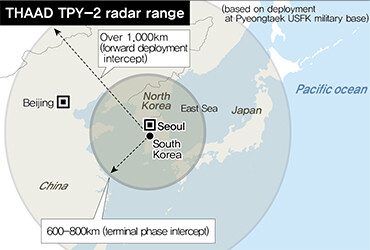hankyoreh
Links to other country sites 다른 나라 사이트 링크
North Korean criticisms seek to pit US, South Korea, Japan against China and Russia

North Korean media are continuing their verbal attacks on the US, South Korea, and Japan over the possible deployment of a Terminal High Altitude Air Defense (THAAD) system on the Korean Peninsula and a recent agreement on the comfort women issue.
The denunciations could be seen as a strategic attempt to pit the three countries against itself, China, and Russia amid a push for sanctions by the international community in response to its recent fourth nuclear test. It is also said that President Park Geun-hye walked into the trap herself with her public mentioning of THAAD and of a “five-party talks” approach to the North Korean nuclear issue.
The Rodong Sinmun, the official newspaper of the North Korean Workers’ Party, attacked the discussions of a possible THAAD deployment in several pieces over the past several days. A Jan. 31 piece in particular emphasized China and Russia as adversaries to the US, which it accused of “becoming more blatant in its desires to deploy THAAD in South Choson [Korea] despite Russia and China’s objections.”
Beijing and Moscow have both expressed reservations about the “forceful and comprehensive sanctions” currently being pursued by Washington.
The newspaper also used the THAAD discussions as a justification for North Korea’s own nuclear tests, calling the missile defense system’s introduction a potential threat to peace and stability in China, Russia, and Northeast Asia in general.
“Hawkish fanatics there and elsewhere are increasing the nuclear threat against us by the day and trampling on peace and stability on the Choson Peninsula and in Northeast Asia with their talk of deploying THAAD in South Choson,” it said.
While Pyongyang has kept up its criticisms of the South Korean and Japanese foreign ministers’ Dec. 28 agreement on the comfort women issue since the beginning of the year, its recent claims have focused on an alleged role in it by Washington. A Feb. 1 piece in the Rodong Sinmun titled “The Deal on the Japanese Military Sex Slave Issue Is an Illegal and Egregious Political Fraud” went after Seoul, Washington, and Tokyo for the agreement, which it claimed was “created according to the White House’s script and direction for the purpose of using its two cat’s paws in Northeast Asia as shock troops in its aggressive strategy for controlling Asia.”
According to Seoul National University Institute for Peace and Unification Studies research professor Chang Yong-seok, Pyongyang’s argument is that its nuclear test has triggered a shift in the Northeast Asia order in which South Korea, the US, and Japan on one side are pitted against China and Russia on the other.
“What North Korea wants is a situation where it’s not one against five, but splintered into three against three or one against two against three, with the different sides fighting and arguing with each other,” Chang said.
Many are now saying Seoul has played into Pyongyang’s hands with its response.
“Things like the appearance of strategic US weapons on the peninsula, the discussion of a THAAD deployment, and talk about ‘five-party talks’ since the nuclear test have done a lot to provoke China and foment antagonism between China and the US,” said one North Korea expert who asked not to be identified.
“When things like South China Sea issues and stronger security cooperation by South Korea, the US, and Japan become the bigger issues over the nuclear one, it gets the situation moving in exactly the direction Pyongyang wants,” the expert added.
By Kim Jin-cheol, staff reporter
Please direct questions or comments to [english@hani.co.kr]

Editorial・opinion
![[Column] Has Korea, too, crossed the Rubicon on China? [Column] Has Korea, too, crossed the Rubicon on China?](https://flexible.img.hani.co.kr/flexible/normal/500/300/imgdb/original/2024/0419/9317135153409185.jpg) [Column] Has Korea, too, crossed the Rubicon on China?
[Column] Has Korea, too, crossed the Rubicon on China?![[Correspondent’s column] In Japan’s alliance with US, echoes of its past alliances with UK [Correspondent’s column] In Japan’s alliance with US, echoes of its past alliances with UK](https://flexible.img.hani.co.kr/flexible/normal/500/300/imgdb/original/2024/0419/2317135166563519.jpg) [Correspondent’s column] In Japan’s alliance with US, echoes of its past alliances with UK
[Correspondent’s column] In Japan’s alliance with US, echoes of its past alliances with UK- [Editorial] Does Yoon think the Korean public is wrong?
- [Editorial] As it bolsters its alliance with US, Japan must be accountable for past
- [Guest essay] Amending the Constitution is Yoon’s key to leaving office in public’s good graces
- [Editorial] 10 years on, lessons of Sewol tragedy must never be forgotten
- [Column] A death blow to Korea’s prosecutor politics
- [Correspondent’s column] The US and the end of Japanese pacifism
- [Guest essay] How Korea turned its trainee doctors into monsters
- [Guest essay] As someone who helped forge Seoul-Moscow ties, their status today troubles me
Most viewed articles
- 1[Column] The clock is ticking for Korea’s first lady
- 2After 2 months of delayed, denied medical care, Koreans worry worst may be yet to come
- 3[Column] Has Korea, too, crossed the Rubicon on China?
- 4US overtakes China as Korea’s top export market, prompting trade sanction jitters
- 5[Editorial] When the choice is kids or career, Korea will never overcome birth rate woes
- 6[Correspondent’s column] In Japan’s alliance with US, echoes of its past alliances with UK
- 7[Photo] Smile ambassador, you’re on camera
- 8Hong Se-hwa, voice for tolerance whose memoir of exile touched a chord, dies at 76
- 9Nearly 1 in 5 N. Korean defectors say they regret coming to S. Korea
- 10Strong dollar isn’t all that’s pushing won exchange rate into to 1,400 range